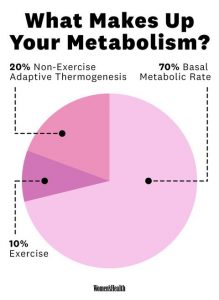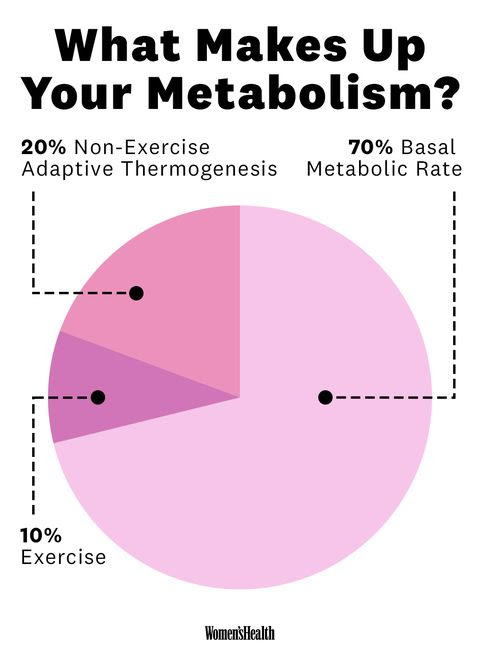2021 Wellness Program “The Beauty Chef”
Metabolism
 Are you struggling with your weight? It’s easy to blame the inability to lose weight on a slow metabolism, but what does that really mean? Is metabolism the problem for most overweight people? Is it possible to boost metabolism so you can burn more calories? Let’s examine the process of metabolism and what impact it has on body weight, weight gain, or weight maintenance.
Are you struggling with your weight? It’s easy to blame the inability to lose weight on a slow metabolism, but what does that really mean? Is metabolism the problem for most overweight people? Is it possible to boost metabolism so you can burn more calories? Let’s examine the process of metabolism and what impact it has on body weight, weight gain, or weight maintenance.
What exactly is Metabolism?
Metabolism is linked to what your weight is, but probably not in the way you think it does. While many overweight people would like to think that their excess weight is the effect of slow metabolism, this often is not the cause of the problem. Yes, it is true that your metabolism has an influence on your body’s basic caloric (energy) needs. However, it still comes down to your food and beverage intake, and the amount of physical activity that you get each day. These are the factors that will have the most effect on what your weight will be.
Metabolism is defined as the process of how your body converts what you eat into energy. Calories are another term for energy, and the energy we get from foods is what supplies energy to all of the cells in our body. During the very complex process of metabolism, calories from food are combined with oxygen, other cofactors (i.e. vitamins, minerals) or enzymes in order to release the energy from the food and ultimately supply it to your body for various functions. The metabolic function is taking place all of the time, even when you are at rest. The processes of respiration, circulating blood, growth, repair, or regulating blood sugar are all functions that require energy. So, in essence, you really do burn calories even while you sleep!
The number of calories that you use to carry out such functions is known as your basal metabolic rate, or BMR. Your BMR represents the number of calories your body needs simply to exist. In order to stay healthy, people need to maintain a certain number of calories for basal metabolism. Everything over and above that is what fuels activity, or if in excess of what you need, causes weight gain.
Want to Know your BMR? You can use a simple BMR calculator.
It’s important to know that there are a number of factors that determine your individual BMR:
First, BMR takes into consideration your body size. Larger people have more weight to maintain and move around, therefore they require higher amounts of calories, even at rest. Smaller or lower weight people have caloric needs that are less. Since size (height and weight) are big factors in calorie needs, it stands to reason that as you lose weight, your calorie requirement will likewise decrease. This is one reason that many people notice that weight loss becomes more challenging and slower as time goes on. When weight goes down, the calorie requirements decrease as well..an important thing to know in the weight loss process!
Another determining factor for BMR is your gender. Men generally have less body fat and more muscle than women. Muscle is metabolically active tissue, whereas fat is mostly storage tissue. This means that the caloric requirements for men are higher. We have seen many spouses who go on weight loss plans together and almost always, the man loses more weight than the woman. We know ladies; it’s not fair! Unfortunately, the reason is biologically based and out of your control!
Lastly, your age is a major determining factor in the BMR calculation. As we age, the amount of muscle in our body decreases, and fat tends to account for more of our body weight. The result of decreased muscle mass is a slower metabolic rate and reduced caloric need. To put it simply, the older you get, the more challenging the weight loss becomes. This is one of the reasons why exercise plays such an important role in weight management!
One thing to keep in mind is that your calorie needs for your body’s basic functions remain pretty consistent over time and aren’t easily changed. If there is a significant change to your body, such as a catastrophic illness, fever, or trauma, then BMR increases along with caloric needs.
Your basal metabolic rate accounts for about 60 to 75 percent of the calories you burn every day. There are two other ways that your body burns calories:
Thermogenesis: This represents the calories it takes for you to digest, absorb, transport, and store the food you have consumed. Calories used from thermogenesis account for 10 percent of your total calories.
Physical activity: Any physical activity or exercise accounts for the rest of the calories your body burns up every day. Hands down, physical activity is the most variable of all of the factors which determine the calories you require on a daily basis.
So here are a few ideas to think about; the BMR uses anywhere between 60-75% of all the calories you consume, and the thermic effect of food uses another 10%. The remainder gets added to determine the Daily Caloric Intake Target for your individual needs.
The difference in the calories between your Daily Caloric Intake Target and what you “burn” by way of BMR and thermogenesis is the big variable here. Activity factors are added over and above BMR to account for the calories burned through activity. People who are sedentary and do not get much activity require much fewer calories than those who are moderately or very active. So, your Daily Caloric Intake Target is an important number to pay attention to. If you stay at or below target for daily calories, you should start to realize weight loss. On the other hand, if you consistently go above the target, over time, you will gain weight.
Diet: Eating a Regular Times
Now that you know more about metabolism, let’s examine the idea of eating at regular times. Snacking done correctly may actually help some people control their caloric intake. For others, snacking merely becomes a way to consume even more calories and they gain weight. The bottom line is that there is no rule on this matter that everyone should follow. The debate about whether you should eat 3 meals or 6 small meals each day has not adequately been resolved through studies. Based on what you have learned about your own eating habits, you get to decide whether snacking between meals is right for you.
One thing that does seem to matter is that consuming meals at routine times is beneficial, regardless of whether you choose just 3 meals a day or you include snacks. When you feed your body at regular intervals, you send the body a signal that it does not have to “store” calories for later use. When skipping meals occurs on a regular basis, the calorie deprivation puts the body into storage mode. This is something that may happen to the person who frequently skips meals, and it affects metabolism in a negative way.
If you are aiming to lose weight, skipping meals is not helpful, and may actually sabotage your efforts. Earlier we discussed the fact that body functions make up basal metabolism, and there is an additional caloric requirement that comes from the thermic effect of foods. Keep in mind that eating engages the body in the digestive process, which ultimately has an effect on metabolism (it increases). If you don’t consume food and engage the digestive process for long periods of time, your metabolism does not have to work and ultimately slows down. The fact that cells are “starved” for energy from long periods of time without food, makes you feel starved for energy too, and you slow down!
The real downside to skipping meals is that when the person does finally eat, they end up eating just as much as they would have eaten in a whole day. Why is that a bad idea? A study, conducted by diabetes researchers at the National Institute on Aging, found that skipping meals during the day and eating one large meal at the end of the day resulted in potentially risky metabolic changes. The meal skippers had elevated fasting glucose levels and delayed insulin response — conditions that, if persist long term, could lead to diabetes.
Our experience with “one meal a day” people has been that they not only match the calories of the 3 meal a day people, but they often go above and beyond their caloric needs because they are so hungry! Consider the healthier options. We are not suggesting that you must eat by the clock after so many hours, however, at a minimum choose to eat at least 3 balanced meals a day at fairly regular intervals.
To recap, For the majority of people with weight concerns, a “slow metabolism” is seldom the reason for excess weight. Having too much weight and/or the inability to lose weight is the result of many variables dictated by one’s lifestyle and eating habits. Simply blaming one’s metabolism does not usually address the real causative factors. Skipping meals or going for long periods of time without eating can have a negative effect on metabolism, so we don’t recommend that as a weight-loss strategy. Unfortunately, there is no food or magic bullet that will “speed up” your metabolism. Regular exercise and the gradual building of lean muscle mass through exercise can help to increase metabolism and calorie burn.
HOMEWORK
Seminar TONIGHT!
Please plan on attending our live seminar. We will be looking at a couple of beverage recipes – and you can ask Chef Jonathan questions!
Sunshine Grindz 5:45pm
This is a great opportunity for those who cannot make our Thursday night events.


